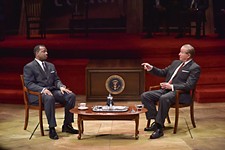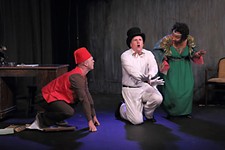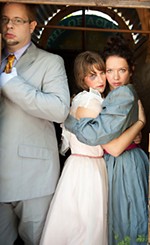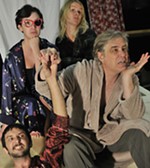The 24th Day
Not everything in Arts on Real's production of The 24th Day comes together as well as it might, but Tony Piccirillo's script works quite effectively on the level of human drama
Reviewed by Barry Pineo, Fri., June 23, 2006

The 24th Day
Arts on Real, through June 24
Running Time: 2 hrs, 10 min
The apartment is seedy, with dirty smudges on the front door where it's been closed more times than anyone can count; black-and-white-checked tile that's scuffed and probably has never been cleaned; furniture that's old and falling apart; a tiny, crowded kitchenette, and strange, mismatched knickknacks lying haphazardly around. It's Tom's place, and while it looks like a pit, he seems a nice enough guy: kind of shy, soft-spoken, handsome and big, imposing, a lifter adorned with conspicuous tats. He's picked up Dan in a bar – or allowed himself to be picked up – and brought Dan home for what appears to be some casual sex. Dan is clearly interested in the latter, very much the aggressor, but Tom isn't in much of a hurry. In fact, Tom seems more interested in slugging back drinks, more interested in asking Dan very personal questions, more interested in … something else.
I don't want to give too much away. This is a thriller, after all, and giving too much of a thriller away can really ruin the story. So, I'll offer this: Tom is straight, Dan is gay; they had sex once, five years previous, the only time Tom has ever been with a man; 24 days previous, Tom discovered that he has HIV. He's certain he got it from Dan, and he wants payback. Just one little problem, though: Dan swears he's healthy and safe. He couldn't possibly have infected Tom.
Though it's a thriller on its face, with a deep and deadly plot, this Tony Piccirillo script, directed by Blake Yelavich for Arts on Real, works quite effectively on the level of a human drama. Piccirillo has created two very believable characters and placed them in a situation that allows us to care about both of them. Tom is deeply conflicted because he's doing something that feels emotionally right but that he knows is morally wrong. Dan is self-centered and manipulative, but we forgive him because of his extreme plight.
Of course, none of it would work without two believable, compelling performers, and director Yelavich has those as well. Kenny Petitte is an extremely likable actor, and his Tom is a potent portrait of a deeply conflicted individual, especially at the beginning of the play. Joe Chauncey, who alternates in the role of Dan with Joseph Hart, looks like a party boy and plays one fairly convincingly, but he's even more convincing as a whining, pleading, desperate prisoner being threatened with a butcher knife while duct-taped to a chair.
But not everything comes together as well as it might. More than a few times, tremendously important moments blow by with very little acknowledgment. In the first act, during a key scene, excessive movement undercuts the tremendous tension that should be present in the story. For much of the second act, a slow tempo is employed when a considerably quicker one would have been much more effective. Perhaps most disappointing, the violence isn't believable. But fortunately, Piccirillo's effective treatise on the nature of truth is, holding a mirror up to anyone who isn't afraid to look and see the very clear reflection of our own pleasure-seeking, truth-spinning selves.










